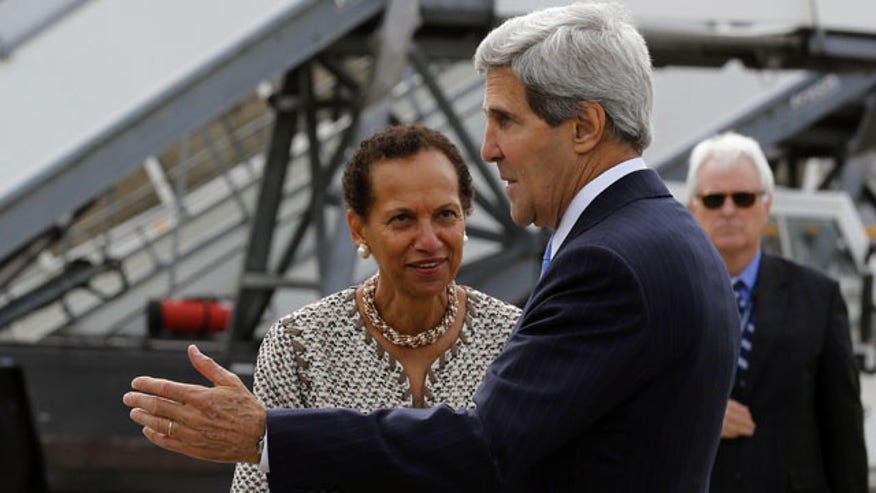
September 12, 2013: U.S. Secretary of State John Kerry, foreground, is welcomed by the U.S. Permanent Representative to the United Nations in Geneva Amb. Betty E. King, on arrival at Cointrin Airport, in Geneva prior to his meeting with Russian Foreign Minister Sergey Lavrov to discuss the ongoing problems in Syria. (AP Photo)
GENEVA – An early test of how serious Syrian President Bashar al-Assad is about dismantling his arsenal of chemical weapons will come when his regime provides a declaration listing its various components, along with an inventory of related production and storage facilities, senior U.S. officials said.
The American officials, all top aides to Secretary of State John Kerry, spoke aboard his airplane late Wednesday evening as it headed for Geneva. There, Kerry faces a critical set of meetings, over two days, with Russian Foreign Minister Sergey Lavrov. The two chief diplomats will be joined by teams of technical experts whose goal will be to assess swiftly whether the Russians can present a credible and verifiable plan for bringing the Syrian chemical weapons program under international monitoring and control.
The Kremlin is attempting to broker the dismantlement of the arsenal as an alternative to planned U.S. strikes against the Syrian regime, which President Obama has urged as necessary to respond to a massive chemical weapons attack near Damascus on Aug. 21, said to have killed more than 1,000 people. In advance of the meeting, Russian President Vladimir Putin used a New York Times op-ed to pressure Obama to back off the threat of strikes, but a senior Obama administration official said in response that Putin is the one whose credibility is on the line, and "the world will note" whether Russia follows through on its commitment.
"There are some specific things that we can ask for, and see if they get delivered very quickly, that will give us an early sense of whether there is reality here or not," one senior U.S. official told reporters traveling with the secretary of state. "The category that you all know most easily is to declare all of their stockpile quickly."
To gauge the Syrians' honesty on that score, the U.S. delegation -- made up of officials from the Department of State, the Pentagon, and the National Security Council, and including arms control experts, intelligence officers and scientific advisors -- brought to Geneva a highly classified inventory of what the U.S. believes to be the Syrian regime's stockpile, its production and manufacturing equipment, and its known delivery systems.
The U.S. inventory will be compared to a similar document being brought to Geneva by the Russian delegation, presumably developed in close consultation with the Assad regime, Moscow's longtime ally.
Aides to Kerry said another early "benchmark" for assessing the seriousness of the disarmament effort will be whether the two sides can reach "rapid agreement on principles" for moving forward. "And that means a rapid beginning to international control," a second U.S. official specified.
State Department officials confirmed that the U.S. will seek to place at least some "munitions" used by the Syrian army to deliver its chemical weapons, as well as "precursor chemicals" used in the mixing of such weapons, under the category of proscribed items to be dismantled and ultimately destroyed.
Kerry initially proposed the disarmament effort as an alternative to the planned strikes in a seemingly impromptu way -- his aides at first described his remarks as wholly rhetorical -- during a news conference in London on Monday. At that time, Kerry also stated flatly that the dismantlement of Syria's chemical weapons arsenal on a rapid timetable "can't be done, obviously."
Kerry's aides have since said that his proposal was actually first broached with the Russians back in May, and that it gained new impetus after the London event, when it drew the sudden backing of the Russians and the Syrians. The endorsement of the idea from Damascus marked the first time the Assad regime has acknowledged possessing chemical weapons. These developments the Obama administration attributes to the president's announcement of his decision to use force to respond to the Aug. 21 attack, a threat that was somewhat blunted by Obama's subsequent decision to seek congressional authorization for the strikes.
Kerry's spokesperson, Jennifer Psaki, had earlier told reporters on Wednesday that the U.S. delegation was heading into the session with Lavrov and his technical experts with "eyes wide open" -- an expression of some skepticism in Washington about Syrian and Russian intentions.
But a senior aide traveling with Kerry expressed cautious optimism -- in seeming contrast with the secretary's original, dour assessment in London -- that the task of cataloguing, collecting, and securing Syria's banned arsenal can indeed be achieved, even if undertaken on a compressed timetable and in what U.S. officials called the "non-permissive environment" of the Syrian civil war.
"It is doable," the aide said, "but difficult and complicated."
U.S. officials said they had been studying past disarmament efforts along similar lines, from those involving the U.S. and Russia -- once the world's top two developers of chemical weapons -- to more recent initiatives involving Saddam Hussein's Iraq and Libya under Muammar Qaddafi.
Of these, the Iraqi experience is considered to offer current officials the closest analogue. That is because Qaddafi's divestiture of banned weapons systems was voluntary, while Saddam Hussein's disarmament -- as would be the case if Assad followed suit -- was carried out in what U.S. officials called "a resistant environment."
Kerry's first meeting in Geneva will be with Lakhdar Brahimi, the United Nations and Arab League envoy for the Syrian crisis.


0 comments:
Post a Comment